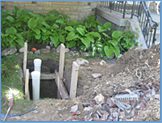The Top 10 Ways to Avoid Wet Basement Repair Work
 Over the years, we have helped thousands of homeowners address their leaky basement needs through a variety of work, from simply cleaning out clogged drains or replacing hot water heaters to more intense solutions involving excavation or full water service replacement. Wet basement repair work can be costly and time consuming, but one thing we pride ourselves on is educating customers about preventative measures they can take to keep their basements dry throughout the year. If you keep your basement dry, and take a pro-active approach to looking for problems before they worsen, you can avoid expensive repairs down the line.
Over the years, we have helped thousands of homeowners address their leaky basement needs through a variety of work, from simply cleaning out clogged drains or replacing hot water heaters to more intense solutions involving excavation or full water service replacement. Wet basement repair work can be costly and time consuming, but one thing we pride ourselves on is educating customers about preventative measures they can take to keep their basements dry throughout the year. If you keep your basement dry, and take a pro-active approach to looking for problems before they worsen, you can avoid expensive repairs down the line.
The Top 10 Ways to Avoid Wet Basement Repair Work
- If you have trees on your property, or there are trees nearby in a neighbor’s yard, make sure your gutters and downspouts are clean. If they are filled with debris, remove any loose items such as leaves or tree branches.
- Make sure soft surfaces on your property are graded away from your house. If a neighbor’s residence is close by yours, pay attention to how water flows from their property onto yours.
- You can also avoid wet basement repair work by making sure the ground that butts up against walls flows away from the house. Flat ground near your foundation walls will result in standing water — which could eventually make its way inside through tiny cracks or holes.
- Check to see if you have a Palmer valve installed in any basement plumbing and, if so, that it is working properly. This mechanical device is meant to help discharge excess storm water.
- If you have a sump pump, make sure it’s working. This involves ensuring the unit is plugged into an electrical outlet or has fresh batteries installed, and can be tested by pouring water into the sump pit.
- Periodically inspect poured concrete or cinder block walls for small holes or cracks.
- The need for wet basement repair can be eliminated if you pay attention for signs of efflorescence on walls and floors. This is a white, powder like substance that builds up when ground water with minute traces of acid begins eating away at the concrete in the walls or brick.
- Keep your eyes open for storm related damage throughout your neighborhood. If severe weather results in downed or uprooted trees uphill from your home, there is a chance the underground sewer lines could be disrupted as well. We often receive calls for wet basement repair after severe weather, so be pro-active and identify problems before they worsen.
- Watch floor drains, tiles, and the sump pit for signs of sand or tree roots.
- Pay attention for signs of mold or mildew in your basement, neither of which would grow without the presence of water or significant moisture.
It is an unfortunate fact of home ownership that wet basement repair work cannot always be avoided. With a bit of diligence, however, the scope and cost of the repairs can be minimized. Visit us on Google+


